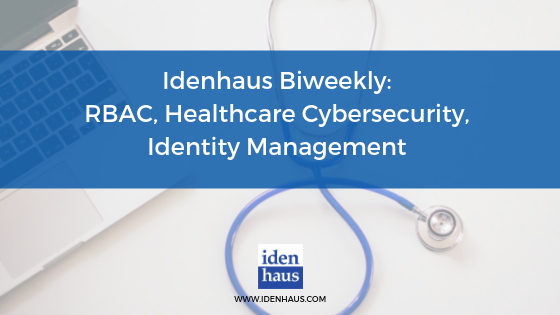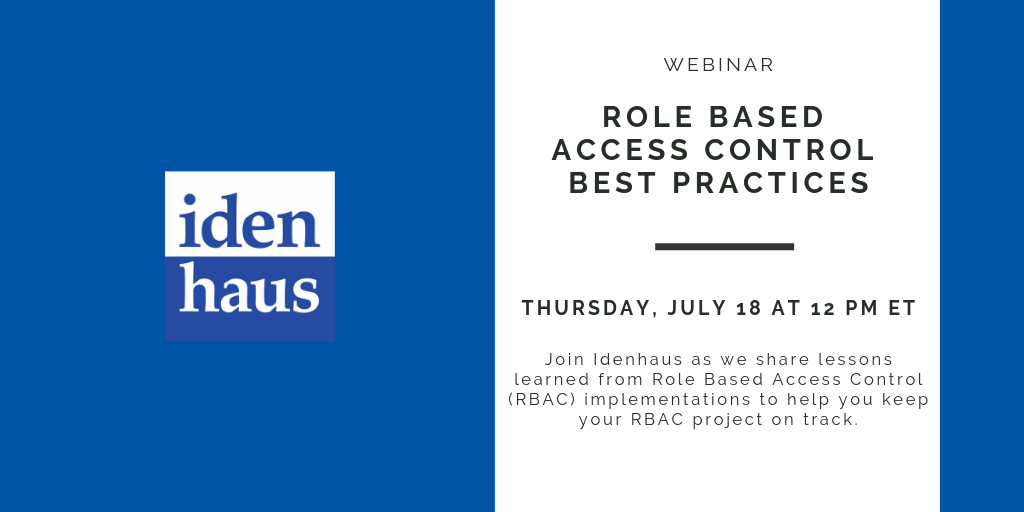
Thanks for reading the Idenhaus Identity Management & Cybersecurity biweekly news digest. Every two weeks, we curate a selection of insightful Access Management, IGA, Identity Management & Cybersecurity articles. We recently launched a new resources section with on-demand webinars, case studies, and educational videos.
Subscribe to our biweekly newsletter here.
Best Practices for Role Based Access Control (RBAC) via Idenhaus
Organizations often struggle to implement RBAC, despite the fact that it makes managing access more understandable for the business and more manageable for IT staff. The typical challenges begin with data quality; however, providing thoughtful oversight to make hard decisions about process, data, standards, and priorities is also a major stumbling block.
Data breaches cost hospitals $408 per record: 5 things to know via Becker’s Healthcare
The U.S. healthcare system lost $6.2 billion in 2016 due to data breaches, with the average data breach costing healthcare organizations’ $2.2 million
Identity access management at a crossroads via TechTarget
“Identity hasn’t been absorbed by security, but it’s becoming more important inside the security conversation. We anticipate spending to shift away from traditional security tech toward identity-based technology like [multifactor authentication].”
A call to upgrade public health data via Politico
The data collection systems public health organizations use are so outdated that it’s difficult to get ahead of outbreaks of diseases, several experts said during a briefing at the Capitol last week.
How to set up multi-factor authentication for an IAM user in AWS via TechRepublic
MFA protocols are a simple best practice for increasing the overall access security of AWS cloud services and could prevent costly security breaches in your enterprise.
Just-In-Time Access: Right Access, Right Resources, Right Reasons via Security Boulevard
Just-in-time access is geared towards eliminating standing access and then dynamically bumping up privileged rights only when requested. The methodology, ideally, reduces friction for end-users and improves the security posture of the organization – so long as a clear and robust audit trail is provided.
6 ways smaller health systems are falling behind in cybersecurity via FierceHealthcare
While large healthcare organizations are successfully adopting best practices for cybersecurity, smaller health systems and hospitals are falling behind as budget constraints and a lack of qualified talent hinder progress.
Which RBAC Approach Is Better: Top-Down or Bottom-Up? via Idenhaus
Role Based Access Control (RBAC) projects are generally organized in one of two RBAC approaches: top-down (start with the business roles) or bottom-up (start with the user data and technical roles) and use that information to work up to insights. But is there a “right way”? Is one approach better or more effective than the other?
In this webinar on July 18, 2019, you will learn best practices that will reduce RBAC delivery risk and allow you to deliver more value to the business.
Webinar Highlights:
· High-Level overview of Roles-Based Access Control
· Developing the right RBAC Strategy for your organization
· Governance as a key enabler
· Best practices for role analysis
· Open Q&A
Register now for Identity Management: Role Based Access Control Best Practices Webinar
Check out our previous digest of insightful Identity Governance and access management articles here: Idenhaus Biweekly: Healthcare IAM, Access Control, and Privacy
Follow @Idenhaus on Twitter and subscribe to our biweekly newsletter.
By going to work quickly to solve the most challenging cybersecurity and identity management problems, Idenhaus takes the pain out of securing corporate information and assets for companies that aspire to maximize their potential in this digital age. Click here to contact us







